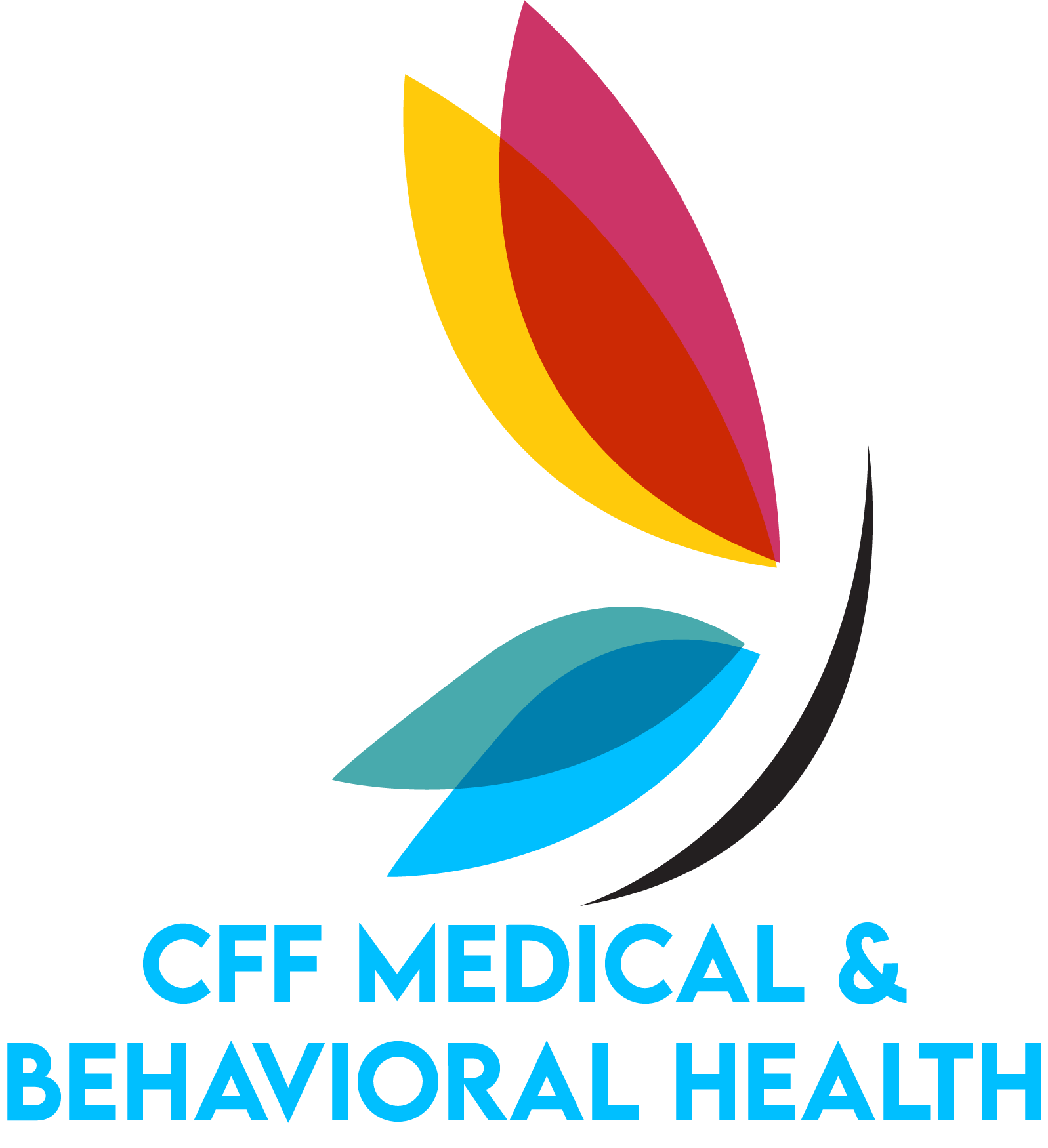Free Crisis Hotline
1-800-273-TALK (1-800-273-8255)
PLEASE RETURN TO THE EMERGENCY DEPARTMENT IF:
- You develop new or worsening thoughts of harming yourself or others
- You have hurt yourself and need medical attention (Please call 911 if seriously hurt or if concerned about an overdose)
- You have new and/or worsening symptoms
- If you feel unsafe at any time, call 911 or go to the nearest emergency room.
PLEASE RETURN TO THE EMERGENCY DEPARTMENT IF:
IF YOU NEED HELP RIGHT AWAY, CALL 9-1-1
Take Control of Focus, Impulsivity, and Daily Productivity
Attention-Deficit/Hyperactivity Disorder (ADHD) is more than just difficulty paying attention—it affects focus, organization, emotional regulation, and impulse control, making daily tasks, work, and relationships challenging. While ADHD can feel overwhelming, effective treatment can provide the structure and support needed to thrive.
At CFF Medical & Behavioral Health, we specialize in comprehensive, evidence-based ADHD treatment for children (ages 6+), adolescents, and adults. Our approach combines personalized therapy, medication management, and behavioral coaching to help individuals increase focus, develop coping strategies, and improve self-regulation.
Whether you or your child struggles with completing tasks, staying organized, managing emotions, or controlling impulsive behavior, we are here to help.
Who Is This Service For
Our ADHD Treatment Program is designed for individuals who experience.
✔ Chronic Inattention & Disorganization – Difficulty staying focused, following instructions, and keeping track of tasks.
✔ Impulsivity & Poor Decision-Making – Acting before thinking, blurting out answers, or struggling with patience.
✔ Hyperactivity & Restlessness – Feeling constantly “on the go,” unable to sit still, or talking excessively.
✔ Difficulty Managing Time & Responsibilities – Struggling to meet deadlines, organize work, or finish projects.
✔ Emotional Dysregulation & Frustration – Strong emotional reactions, difficulty handling stress, or frequent mood swings.
✔ Relationship Challenges – Struggles with communication, impulse control, or following social cues.
If ADHD symptoms interfere with school, work, relationships, or daily responsibilities, our treatment program can help you develop the skills needed for long-term success.


Understanding ADHD Different Types & Symptoms
ADHD presents differently in every individual. Our providers conduct a detailed assessment to diagnose and determine the best course of treatment based on the type of ADHD you have.
Predominantly Inattentive Type (ADHD-I)
✔ Easily distracted and struggles to focus on tasks
✔ Frequently forgets things, misplaces items, or misses details
✔ Trouble following multi-step directions or completing tasks
Predominantly Hyperactive-Impulsive Type (ADHD-HI)
✔ Restless, fidgety, or constantly in motion
✔ Struggles with self-control, waiting turns, or interrupting conversations
✔ Makes impulsive decisions without considering consequences
Combined Type (ADHD-C)
✔ A mix of both inattentive and hyperactive-impulsive symptoms
✔ Difficulty focusing and controlling impulses
✔ Often struggles with emotional regulation, organization, and task completion
Recognizing the specific type of ADHD helps us develop a customized, targeted treatment plan that maximizes strengths while addressing challenges.
Our Approach to ADHD Treatment
Comprehensive ADHD Evaluation & Diagnosis
✔ One-hour clinical assessment to determine ADHD type, symptom severity, and treatment goals
✔ Exploration of co-occurring conditions (such as anxiety, depression, or learning disabilities)
✔ Input from parents, teachers, or partners (if applicable) to provide a full picture of daily challenges
Medication Management (If Needed)
Medication is not required for ADHD treatment, but for some individuals, it can provide significant improvements in focus, impulse control, and organization. Our team provides.
✔ Stimulant Medications (Adderall, Ritalin, Vyvanse, Concerta, etc.) – Enhances focus and reduces hyperactivity.
✔ Non-Stimulant Medications (Strattera, Guanfacine, Wellbutrin, etc.) – Alternative options for those who prefer non-stimulant treatment.
✔ Careful Dosage Adjustments & Monitoring – We work closely with you to minimize side effects and maximize effectiveness.
Cognitive Behavioral Therapy (CBT) & Behavioral Coaching
Therapy helps individuals with ADHD develop structured routines, better emotional control, and improved decision-making skills. We use.
✔ CBT for ADHD – Helps reframe negative thought patterns and improve organization.
✔ Behavioral Interventions – Teaches practical skills for impulse control and time management.
✔ Social Skills Training – Helps improve relationships and communication strategies.
Time Management & Productivity Coaching
ADHD can make staying on top of tasks and deadlines difficult, but structured support can help. We focus on.
✔ Building Effective Daily Routines – Developing consistent schedules and organizational habits.
✔ Task Prioritization & Planning – Breaking work into manageable steps to improve follow-through.
✔ Overcoming Procrastination & Distractions – Strategies to stay focused and complete projects.
Parent & Family Support (For Children & Teens with ADHD)
When children and teens have ADHD, family involvement is essential. We offer.
✔ Parent Coaching & Education – Guidance on positive reinforcement techniques and structured home routines.
✔ School & Academic Support Plans – Strategies for classroom accommodations and IEP/504 plan recommendations.
✔ Behavioral Therapy for Teens – Helps adolescents build independence, confidence, and self-regulation.
How ADHD Treatment Can Improve Daily Life
Our comprehensive ADHD treatment program is designed to help individuals.
✔ Increase Focus & Attention – Stay engaged with tasks and complete projects efficiently.
✔ Reduce Impulsivity & Improve Self-Control – Make thoughtful decisions and manage emotions more effectively.
✔ Strengthen Relationships & Social Skills – Improve communication and reduce frustration in personal interactions.
✔ Enhance Academic & Work Performance – Stay organized, meet deadlines, and improve productivity.
✔ Develop Healthy Habits & Coping Strategies – Build sustainable routines for long-term success.

Why Choose CFF Medical & Behavioral Health for ADHD Treatment
✔ Expert Providers with 20+ Years of Experience – Specializing in ADHD treatment across all age groups.
✔ Personalized, Multi-Disciplinary Approach – We combine therapy, medication, and skill-building strategies tailored to your needs.
✔ Flexible Scheduling – Open 7 Days a Week – Evening & weekend appointments available.
✔ Holistic & Comprehensive Care – Support beyond medication, including coaching, therapy, and lifestyle modifications.
✔ Judgment-Free, Inclusive Environment – We welcome individuals from all backgrounds, identities, and neurodivergent communities.


